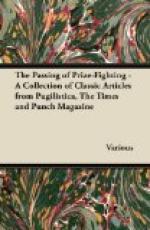* * * * *
“What,” I asked myself, “is just the matter with this apparently quite nice book?” (It was Joan’s Green Year, and written by E.L. DOON and published by MACMILLAN.) It is the kind of book that grows out of a romantic disposition and an assiduously stuffed commonplace book. It consists of letters from Joan, a paying guest in the Manor House Farm at Pelton, to her brother Keith, a soldier in India, telling him all about her year of holiday and “soul discipline” in the country, the village gossip, her proposals and her one acceptance, and giving a sort of farmer’s calendar of the seasons as interpreted by the guileless amateur. Joan has what is known as a nice mind. But to tell truth she has chosen a difficult and dangerous if alluring art form. Of course letters enable you to evade some of the difficulties of the novelist’s task, to be discursive, allusive and incomplete. But you can’t be let off anything of the precision and subtlety of your characterisation. On the contrary. And Joan makes everyone in Pelton (except the rustics, whose authenticity I gravely suspect) talk as Joan writes. They have nearly all seen her commonplace book, I judge. Then, again, you must not have (like Joan) a large list of acquaintances, or you breed confusion and dissipate interest accordingly. Joan is very young in many ways. She is extravagant in the matter of the equipment of her heroes. Bob Ingleby, the farmer (a gentleman, because he had been at Winchester), is a “great comely giant,” yet wins events one and three of the Hunt Steeplechase, though thrown badly in number two. I have a suspicion that this work is really Joan’s tee shot, and that after a notable recovery, which on the best of her present form I can safely prophesy, she will reach her green year next time.
* * * * *




